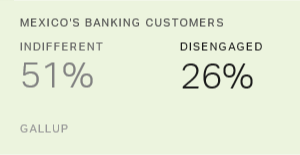GALLUP NEWS SERVICE
PRINCETON, NJ -- A recent Gallup Poll shows that almost half of Americans believe that human beings did not evolve, but were created by God in their present form within the last 10,000 years or so.
These conclusions are based on responses to a specific Gallup Poll question that provides respondents with three alternative explanations for the "origin and development of human beings":
1) Human beings have developed over millions of years from less advanced forms of life, but God guided this process.
2) Human beings have developed over millions of years from less advanced forms of life, but God had no part in this process.
3) God created human beings pretty much in their present form at one time within the last 10,000 years or so.
Which of the following statements comes closest to your views on the origin and development of human beings -- [ROTATE 1-3/3-1: 1) Human beings have developed over millions of years from less advanced forms of life, but God guided this process, 2) Human beings have developed over millions of years from less advanced forms of life, but God had no part in this process, 3) God created human beings pretty much in their present form at one time within the last 10,000 years or so]?
|
Man developed, |
Man developed, |
God created |
Other/No |
|
|
% |
% |
% |
% |
|
|
2006 May 8-11 |
36 |
13 |
46 |
5 |
|
2004 Nov 7-10 |
38 |
13 |
45 |
4 |
|
2001 Feb 19-21 |
37 |
12 |
45 |
5 |
|
1999 Aug 24-26 |
40 |
9 |
47 |
4 |
|
1997 Nov 6-9 |
39 |
10 |
44 |
7 |
|
1993 Jun |
35 |
11 |
47 |
7 |
|
1982 |
38 |
9 |
44 |
9 |
The most recent poll was conducted May 8-11, and is the seventh time this question has been asked in this format, going back to 1982.
There has been surprisingly little change over the last 24 years in how Americans respond to this question. Between 44% and 47% of Americans have consistently agreed with the third alternative, that God created human beings in their present form within the last 10,000 years or so. Between 35% and 40% agree that man evolved with God's guidance, while between 9% and 13% believe that man evolved, but with no guidance from God.
It is important to note that reported attitudes on complicated subjects like evolution are related to the way in which a question is worded and the specific alternatives presented to respondents. This particular question included the phrase "from less advanced forms of life" in the first two alternatives, and used the phrase "God created ..." at the beginning of the third alternative (the second alternative included a reference to God, but it was not at the beginning of the phrase). Other questions probing Americans' knowledge of evolution and their beliefs about the origin of humans -- phrased in different ways -- may produce different patterns of responses.
Detailed Subgroup Analysis
The analysis that follows uses combined data from the last two surveys in which this question has been asked, yielding a sample of 2,002 adults and thus providing the ability to conduct more reliable and detailed subgroup analyses.
First and foremost, there is a major relationship between religion and attitudes toward human origins. Almost two-thirds of Americans who attend church at least once a week believe that humans were created "as is" within the last 10,000 years or so, compared to just 29% of those who say they never attend church.
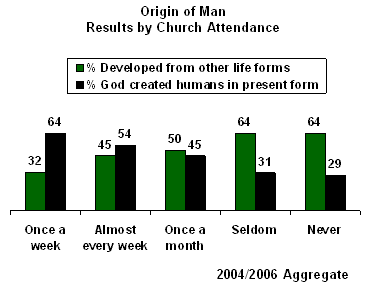
There is a substantial relationship between one's level of education and responses to this question. About three-quarters of those with a post-graduate degree say that humans developed over millions of years from less advanced forms of life, while 22% choose the "created in present form" option.
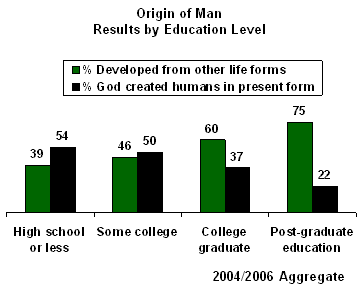
The only major difference by age in these beliefs is among those aged 65 and older, who are less likely to believe that humans evolved than those who are younger. There is very little difference between the very youngest group in the survey (those aged 18 to 29) and those aged 30 to 64.
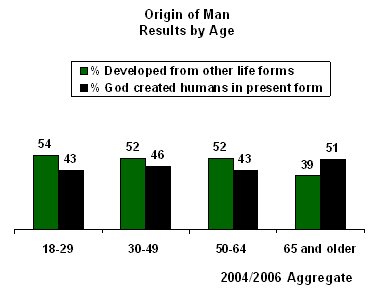
Women -- who tend to be significantly more religious than men -- are also more likely to believe that humans were created in their present form and did not evolve:
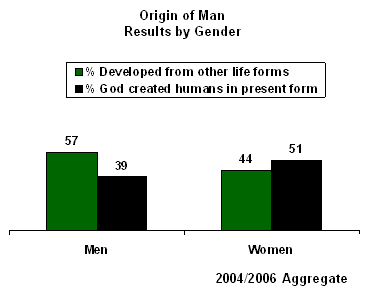
Republicans attend church more frequently than Democrats and independents, so it is not surprising to find that Republicans are much more likely than these other two political groups to believe than humans were created as is and did not evolve over time.
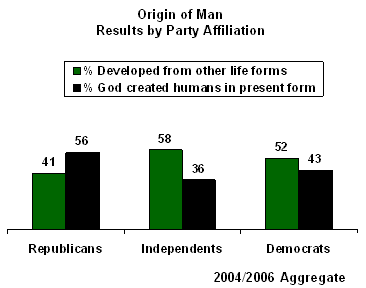
The graph below displays the interaction between religion (as measured by the self-report of having attended church or synagogue within the last seven days), party identification, and belief that man was created "as is" by God within the last 10,000 years. As can be seen, there is a significant impact of church attendance on this belief within all three categories of partisans.
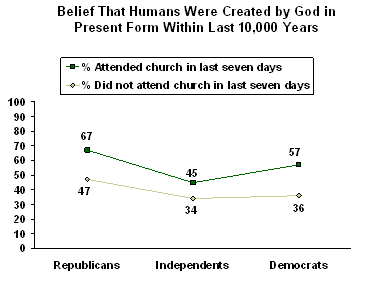
Survey Methods
Results are based on telephone interviews with 2,002 national adults, aged 18 and older, Nov. 7-10, 2004 and May 8-11, 2006. For results based on the total sample of national adults, one can say with 95% confidence that the maximum margin of sampling error is ±2 percentage points. In addition to sampling error, question wording and practical difficulties in conducting surveys can introduce error or bias into the findings of public opinion polls.
